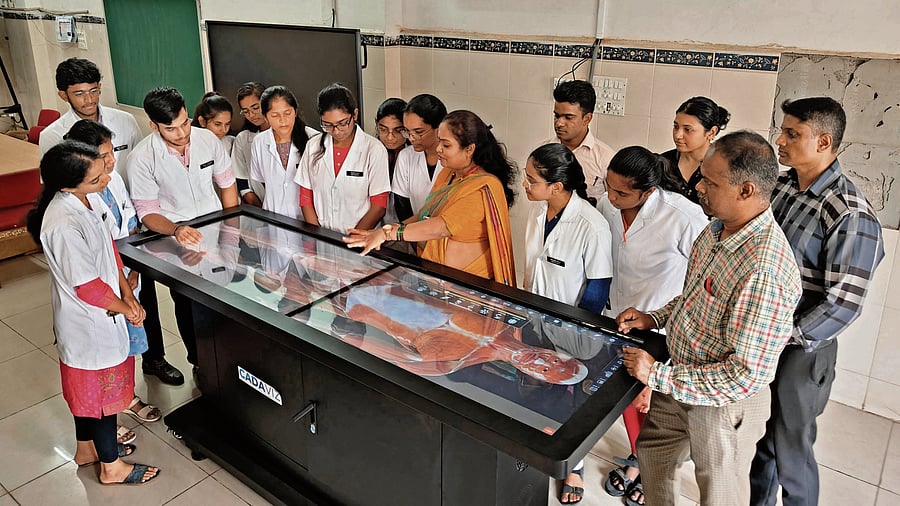
Representational image only.
Credit: DH photo
Hubballi: A majority of the 24 government medical colleges in Karnataka are facing an acute shortage of cadaver bodies for educational use. In the last three years, these colleges received less than 700 bodies against the requirement of 900.
Faculty and students say the shortage impacts their studies as "learning through virtual dissection, pro-section, models, mannequins and plastinated specimens do not give them the real understanding of the subject".
Doctors and activists say shortage persists despite an increase in voluntary donation of bodies.
Several doctors at government medical colleges told DH that getting authorised access to unclaimed bodies is a challenge.
"Every year, government institutes attend to several unclaimed bodies. However, not all of them are provided to the anatomy department as the police, instead of clearing technical hurdles, dispose of the bodies to avoid future complications," said a senior doctor at Karnataka Medical College and Research Institute (KMC RI), Hubballi, requesting anonymity. KMCRI is among the few institutes which receive the highest donation of cadaver bodies. On an average, it received 35 bodies in last three years against the requirement of 20.
National Medical Commission (NMC) guidelines mandate one human cadaver for 10 MBBS students. Every year, approximately 12,400 students enrol for MBBS at 71 allopathic colleges in the state.
Ideally, one body should be used in one academic year and later disposed of scientifically. However, due to a shortage of body donations, institutes are forced to store these formaldehyde-treated bodies for years. The longer the bodies are chemically treated, the harder they become making dissection difficult.
The Medical Education Department has estimated that 3,500 students studying at the government medical institutes require a minimum of 301 cadaver bodies every year to study anatomy. Of the total required, government hospital-cum-colleges received 202 in 2022, 236 (2023) and 212 in 2024.
Ballari Medical College and Research Centre, which requires at least 20 cadaver bodies a year, received just five in the last three years. Bidar Institute of Medical Sciences requires 15 bodies annually but received only 14 in three years. Chamarajanagar Institute Of Medical Sciences, instead of getting 45 bodies in three years, had to do with just 16 and Mandya Institute of Medical Sciences had received just 14 bodies against 30 required.
Chitradurga Medical College & Research Institute is among the institutes that did not receive any voluntary body donations in 2022 and 2023. "Annually, we require a minimum of 15 cadavers. Regrettably, our current inventory comprises only 11 bodies," says institute director B Y Yuvaraj.
He says the scarcity of cadavers compromises the quality of education. "While visual aids, 3D imaging and simulator labs are valuable adjuncts, they cannot supplant the indispensable hands-on experience afforded by direct interaction with human cadavers. Students must engage their tactile and cognitive faculties to grasp the intricacies of human anatomy, thereby fostering a more nuanced understanding of the subject," he says.
Strict rules
Bailhongal-based Ayurvedic doctor Mahantesh Ramannavar, known for encouraging body donations, says one of the main reasons why institutes are not receiving body donations is the inability of the institutes and government to create awareness among people. He advocates the active role religious heads can play in improving body donation.
Mysore Medical College and Research Institute director K R Dakshayini says their efforts since 2005 have helped them register over a thousand volunteer donors. "Currently, we are accepting only registered donors and not unclaimed ones. We have sufficient bodies. Being a government institute, we had earlier provided excess cadaver bodies to Chitradurga and Chamarajanagar institutes."
Among private institutes, only a few reputed ones are receiving donations of bodies due to the reputation, while smaller institutes have to depend on NGOs and trusts.
"We often receive requests from various private medical colleges for cadavers but rules prevent us from acceding to their requests. A body donated to an institute has to be used for educational purposes only at that institute," says SDM College of Medical Sciences & Hospital, Dharwad Anatomy department head Veena Kulkarni.
No shortage
Medical Education Principal Secretary Mohammad Mohsin claims there is no shortage of cadaver bodies at government institutes. "Some new institutes might have fewer bodies than required. The government is ensuring that students' education is not affected."